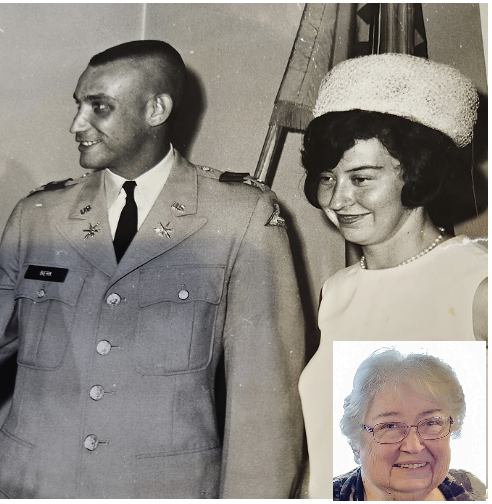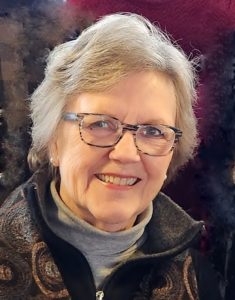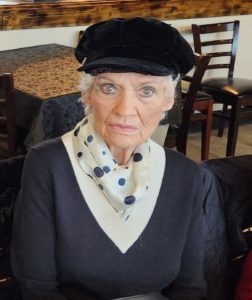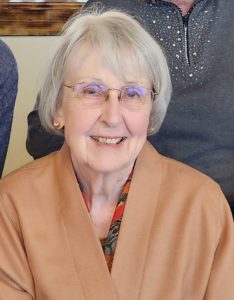When people say the military gets two recruits for the price of one, they are referring to military spouses. Although not officially part of the military, the military spouse enlists on the day she — and now sometimes he — says “I do.”
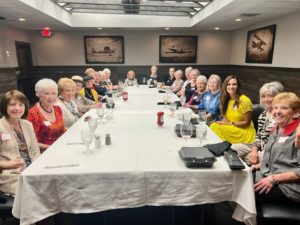
The Retired Officers Wives club, seen here at Rolling HIlls Country Club, has been meeting for over 50 years.
The Retired Officers Wives Club in Wichita is comprised of such spouses. All were married to officers who served in a branch of the Armed Services during the 1950s-70s. These women served alongside them.
Members have been meeting for lunch every month for more than 50 years, enjoying friendship and memories forged by mutual experience.
The experience began with their husband’s first assignment as an officer. Incoming wives attended a welcome luncheon and were introduced to the other wives in their husband’s unit. They were expected to join the Officers Wives Club, attend regularly scheduled events and take part in social gatherings with other couples in the squadron. Some performed volunteer work on the base.
But the main role of the military wife was to keep the family going. When husbands were away, which was often, the wives raised the children, dealt with school and medical issues and carried out the day-to-day running of the household.
Previously, many had never lived away from their families. Now, they found themselves in a totally new environment and one in which they often could not depend on their husband’s presence for support. That’s when they rallied together for one another.
They offered help, shared knowledge and resources, watched out for each other’s children and provided comfort in difficult times. Whenever Susan Norwood heard the phone ring back in those days, she reminded herself “to be sensitive to the fact that whoever was calling may not be having as good a day as I was.”
As the officers’ careers advanced, so did the responsibility of the wives. During the three years that Nancy Brace’s husband served as base commander at McConnell Air Force Base, she was placed in a more formal support role. “I acted as an advisor along with the wing commander’s wife and the vice wing commander’s wife. We attended lots of meetings, shared information and made sure that all the wives were taken care of.”
Adapting to new living environments was a frequent challenge. Living quarters varied greatly with assignments depending on the country, the size of the military installation, timing and luck.
When available, military housing at the larger installations had its advantages. Spouses rarely had to leave the base as everything they needed was there. Medical care was readily available at the base hospital. Child care was available at the nursery, space permitting.
‘On the economy’
Some assignments meant living “on the economy”(military parlance) in off-base rentals that varied in comfort, convenience and amenities. This was taken in stride by the military wife who, in no time, made it home. But experience taught them not to get too comfortable. The next assignment would come with a new set of challenges.
Twila Cosentino remembers a four-and-a-half-year stretch at Glasgow AFB in Montana where she learned to deal with frigid temperature and snow up to the rooftops. With their pilot husbands gone during the winter months, survival was a group activity. Peering out the window to see whose driveway looked the most promising, the wives met at the chosen home and shoveled enough snow to get one car out. Then, they all piled in to run errands together.
Another memorable assignment was when Twila accompanied her husband to the Royal Air Force base in High Wycombe, England. Although they lived in an older rental home requiring they lay down on their backs under the staircase to insert shillings in the meter to keep the gas stove operating, she nevertheless has fond memories of the experience. They especially enjoyed travelling to London by train, even though they were required to dress up wherever they went. She remembered, “This meant wearing high heels to the zoo.”
Cultural immersion
Sue Tanner moved more than 10 times with her school-age children. Her greatest concern was how these moves affected them. Mothers happily discovered that most children were quite resilient, adapting quickly to new schools and friends. In fact, Sue’s daughter, who graduated from high school in Germany, still keeps in touch with her classmates through Facebook.
Susan Norwood’s family spent three years north of Edinburgh, Scotland with few Americans nearby. The experience was a true cultural immergence. Her two children attended school with the local children and soon sported Scottish accents. “We even came to understand the humor,” she said. Sharing meals with the RAF families was fun. But when Susan entertained, it often meant travelling a distance to the nearest U.S. Naval Base to obtain American
staples like peanut butter and mayonnaise (not available in the little village) so her dishes would taste like those back home.
Long-lasting friendships developed. Some still keep in touch to the present day with a Christmas card, visit or get-together at military reunions.
Marilyn Beaver spent time in Morocco with her husband and developed a friendship with a next-door neighbor that has lasted over 50 years. Each year, Marilyn visits her friend in Sarasota, where they attend several operas together.
In case you are wondering, during this period of time, officers’ wives generally didn’t work. As Susie Moran explained, “Our job was being an officer’s wife.” Even as late as the 1970s, Sue Berk recalls the reaction when a colonel’s wife got a degree and full-time job. “It was the talk of the post” she said.
However, this wasn’t true in all cases. Pat DeVoss held nursing positions at local hospitals, working around her husband’s schedule. Flexible hours enabled her to attend scheduled events on base. “I never received any negative feedback. I think it depended on the type of work you did. Being a nurse was acceptable.”
Volunteer opportunities were plentiful. Typically, it was working in the nursery or thrift shop or decorating the Officers Club. However, some opportunities were quite unique. While volunteering at the Ft. Sill Military Museum, it was discovered that Sue Berk was knowledgeable in the care of saddles. She was quickly transferred to the restoration department, where she restored Civil War saddles in the museum’s collection.
Tent City
Sue also remembers a time when the dentists at Kitzingen Army Airfield in Germany were desperate for dental assistants. They trained several of the officer’s wives and gave them regular part-time shifts. “No pay, of course,” she answered.
Nancy Brace will never forget April of 1975 when the fall of Vietnam caused thousands of refugees to flee to Guam. There, she and her husband were part of the all-out effort to build Tent City, housing thousands of refugees waiting to be resettled in the United States or elsewhere. The wives were vital in providing food, clothing and comfort to these families.
Remembering these and other experiences, the military wives of our Wichita Club all agree that these were wonderful years. Despite the hardships and being away from their husbands for long periods of time, most said they wouldn’t change a thing. They learned to become strong, independent women while enjoying the closeness that comes when neighbors become family.
Patti Sullivan is a board member of The Active Age and member of The Retired Officers Wives Club in Wichita.
